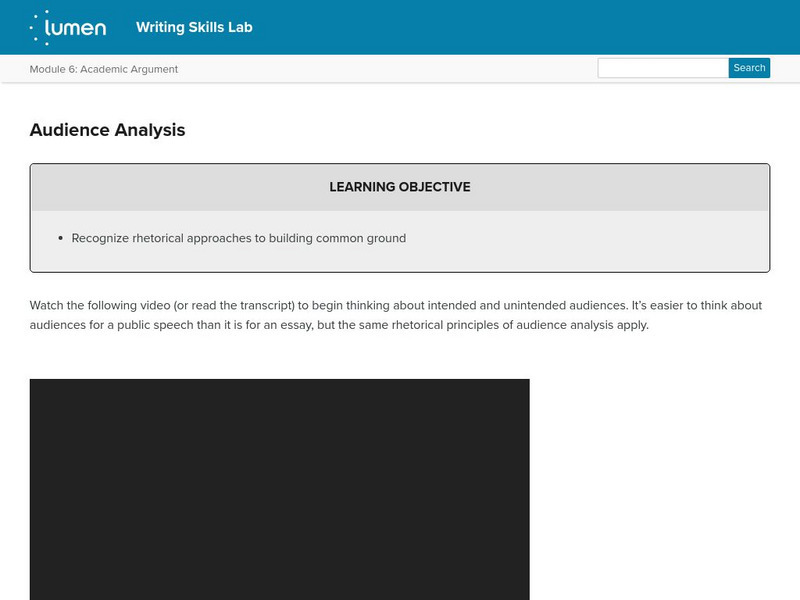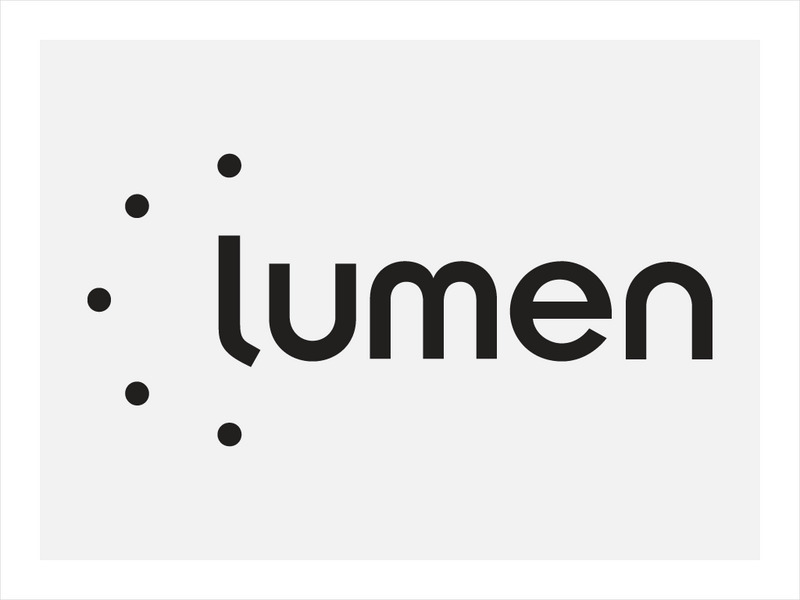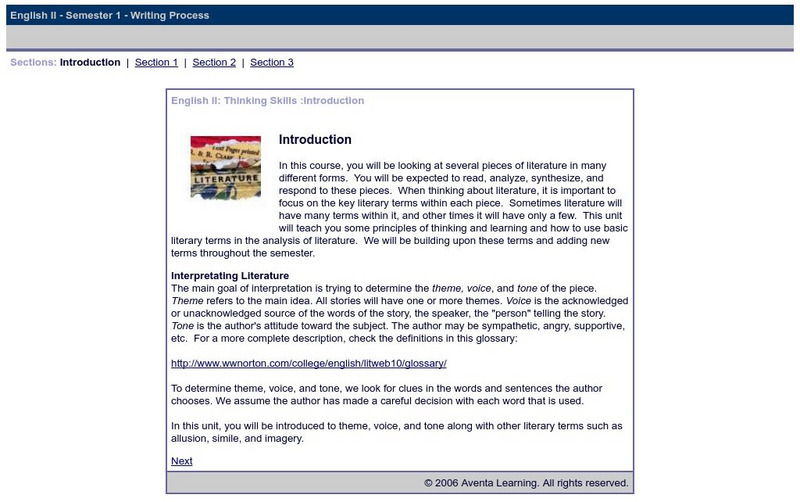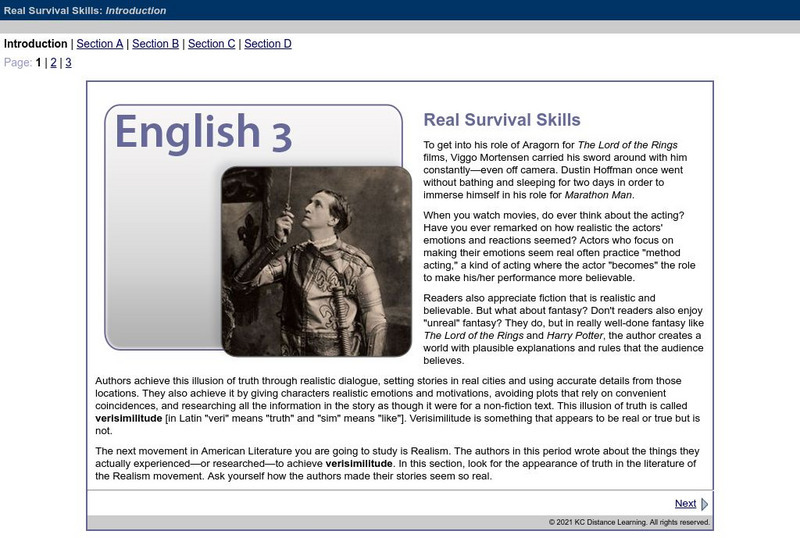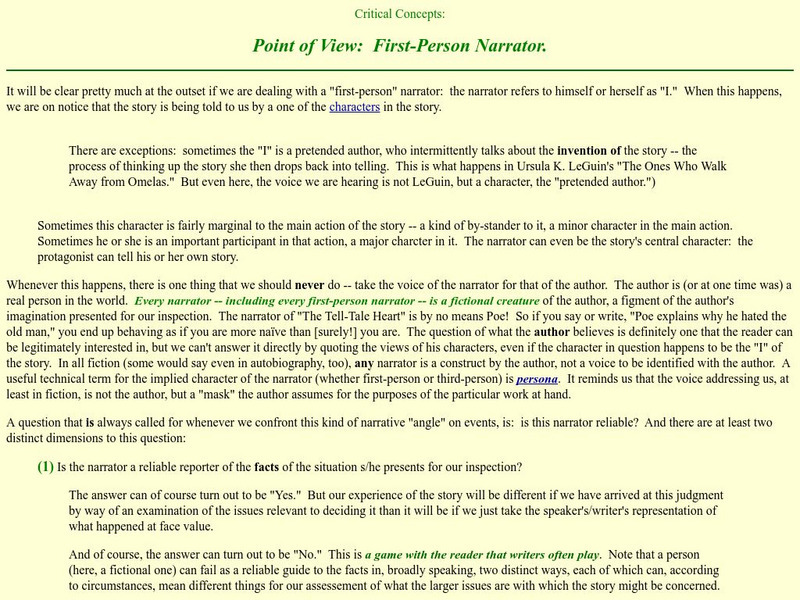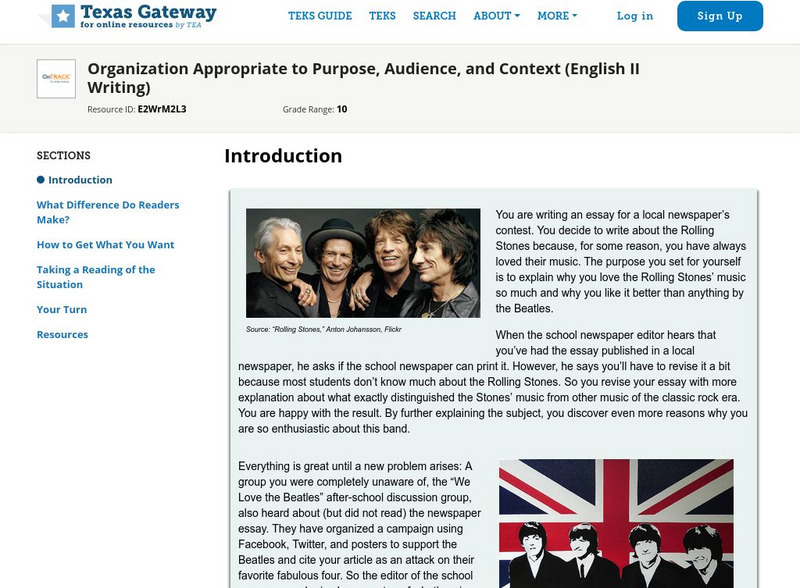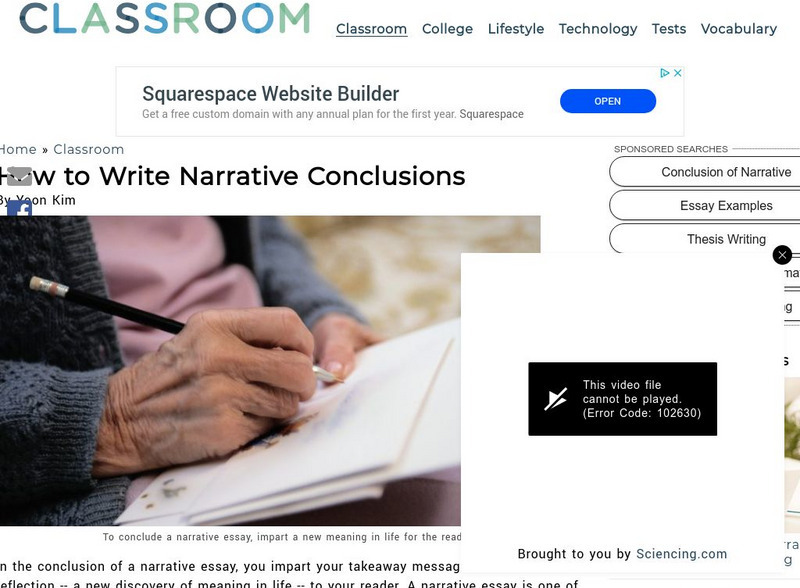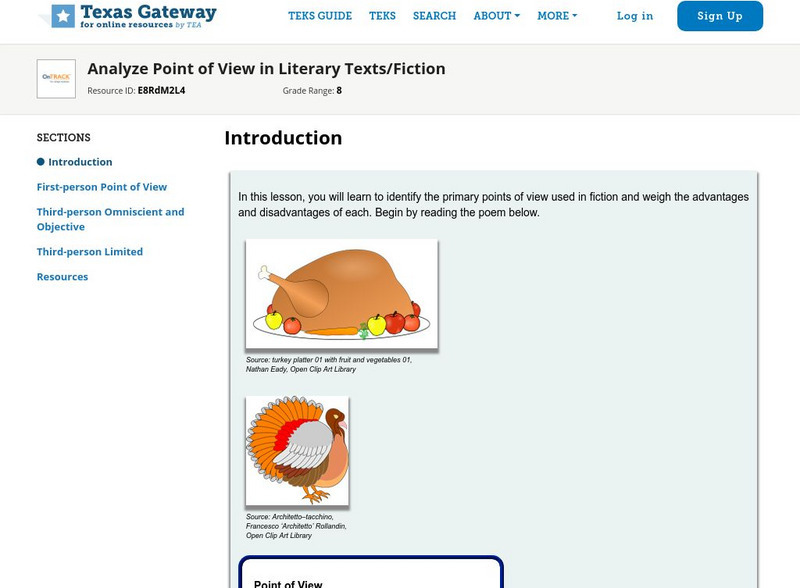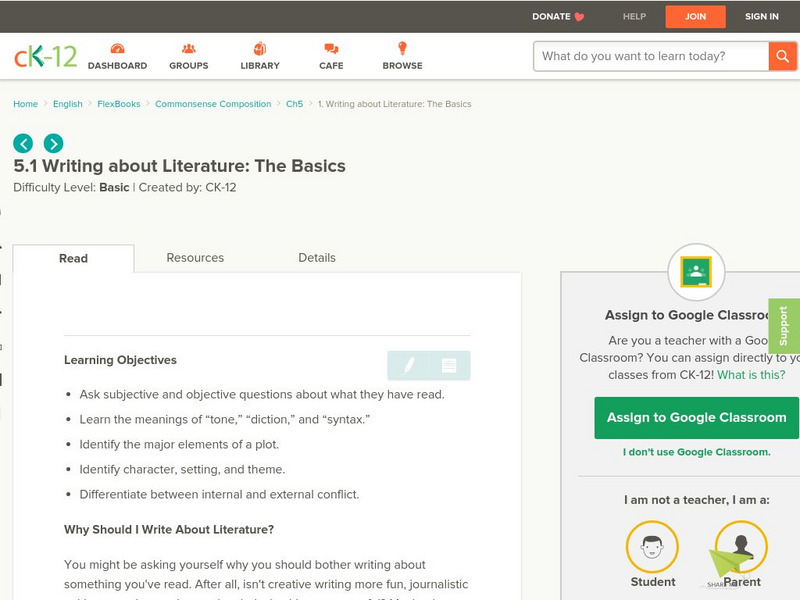Lumen Learning
Lumen: Analysis: Process Analysis
This lesson focuses on process analysis including processes by people, machines, and nature. They can be classified as descriptive and prescriptive. It also includes a practice activity.
Lumen Learning
Lumen: Writing Skills: Audience Analysis
This lesson focuses on audience analysis and recognizing rhetorical approaches to building common ground. A practice activity is provided.
Lumen Learning
Lumen: Introduction to Writing About Literature
This is an introduction to writing about literature; it includes a list of learning objectives for writing about literature including finding and using historical sources to discuss the historical context, finding and using literary...
Lumen Learning
Lumen: Writing About Literature: Finding Literary Criticism
This article focuses on how to find literary criticism including scholarly journals, citations from other works, a list of useful links to find sources, and TAMU libraries' website.
Lumen Learning
Lumen: Writing About Literature: Additional Resources
This is "'The Legend of Sleepy Hollow': An Allegory for a Young America," an exceptional student example of literary analysis as well as an explanation to the main body of her paper. A link to the MLA website is also provided.
Lumen Learning
Lumen: Reading and Interpreting Literary Texts: How to Analyze a Short Story
This lesson focuses on analyzing a short story including all of the elements of a short story such as setting, plot and structure, and characterization.
Texas Education Agency
Texas Gateway: Compare Narrative and Informational Texts: Practice 1
[Accessible by TX Educators. Free Registration/Login Required] In this lesson, you are going to analyze differences in texts that use visual techniques to present narrative and informational content. You will also look at how information...
Department of Defense
Do Dea: Thinking Skills
In this self-guided course, you will be looking at several pieces of literature in many different forms. This unit will teach you some principles of thinking and learning and how to use basic literary terms in the analysis of literature....
Department of Defense
Do Dea: Real Survival Skills
Learn about process analysis, writing procedurals texts, the steps of the writing process, and cause and effect in this unit. Also, examine patterns of organization in writing. A handy chart shows common organizational patterns which...
Lumen Learning
Lumen: American Literature: Reader Response Criticism
This lesson focuses on reader-response literary criticism including the purpose of reader response, the structure of a reader-response essay, how to criticize with examples, and an example of a reader-response essay using "The Secret...
Other
Ksu: Point of View: First Person Narrator
This tutorial surveys the uses and limitations of first-person narration in literature. CCSS.ELA-Literacy.CCRA.R.9
Other
Wisewire: Grades 9 10 Playlist: Analyze How an Author Unfolds an Argument
This is an example of how to analyze how an author unfolds an argument. It provides an example and links to use for practice. RI.9-10.3 author unfolds
Texas Education Agency
Texas Gateway: Informational Text: Analyze an Argument: Practice 1
When you read an argumentative essay or article, you should analyze the author's evidence. However, you can't analyze the evidence a writer gives in support of a position if you don't know the author's perspective.
Texas Education Agency
Texas Gateway: Organization Appropriate to Purpose, Audience, and Context
[Accessible by TX Educators. Free Registration/Login Required] In this lesson, you will learn how to adjust the organization of your essay to make it appropriate for different purposes, different audiences, and different contexts.
Leaf Group
Classroom: How to Write Narrative Conclusions
This article focuses on how to write conclusions for narratives by sharing a takeaway message, a lesson or a reflection -- a new discovery of meaning in life -- for your reader. W.9-10.3e Conclusion, W.11-12.3e Narrative Conclusion
Texas Education Agency
Texas Gateway: Analyze Point of View in Literary Texts/fiction
[Accessible by TX Educators. Free Registration/Login Required] In this lesson, you will learn to identify the primary points of view used in fiction and weigh the advantages and disadvantages of each.
Texas Education Agency
Texas Gateway: Informational Text: Analyze Graphical Sources: Practice 2
[Accessible by TX Educators. Free Registration/Login Required] In this lesson, you will learn how to evaluate the clarity and visual appeal of images and other graphic elements included in a reading text. Practice exercises are included.
Texas Education Agency
Texas Gateway: Analyze How Author's Style and Syntax Support Meaning
In this lesson, we will discuss how an author's syntax reveals meaning and makes ideas stay with the reader. Practice exercises are included.
Texas Education Agency
Texas Gateway: Reading Comprehension Across Genres: Annotate for Meaning
This lesson focuses on Annotation, a "writing-to-learn" strategy. It consists of writing explanatory notes and critical (analytical) commentary to yourself. Annotating text consists of two steps: (1) underlining, highlighting, circling,...
Texas Education Agency
Texas Gateway: Analyze Literary Essays' Inclusion of Personal Opinions and Facts
In this lesson, you will learn how to identify and discuss the use of facts, personal examples, and ideas and how they are woven into a literary essay.
Common Sense Media
Common Sense Media: Character Development and Relationships in Hamlet
A lesson plan relating to Hamlet whose objective is to able to "analyze how and why individuals, events, and ideas develop and interact over the course of a text". Lesson includes a hook, direct instruction, guided practice, and...
Other
Brock University: Critical Reading: A Guide
In addition to thoroughly exploring the purposes and functions of an analytical essay, this resource provides students with step-by-step instructions for reading and analyzing poetry, prose-fiction, and fiction. The site also offers...
E Reading Worksheets
E Reading Worksheets: Author's Purpose Worksheets
Several worksheets and assessments are provided on this module. Students will have numerous exposures to the topic of "author's purpose" in each practice exercise and assessment.
CK-12 Foundation
Ck 12: 5.1 Writing About Literature: The Basics
[Free Registration/Login may be required to access all resource tools.] Learn the basics of how to write about literature by asking subjective and objective questions; use tone, diction, and syntax; identify plot elements, and...



